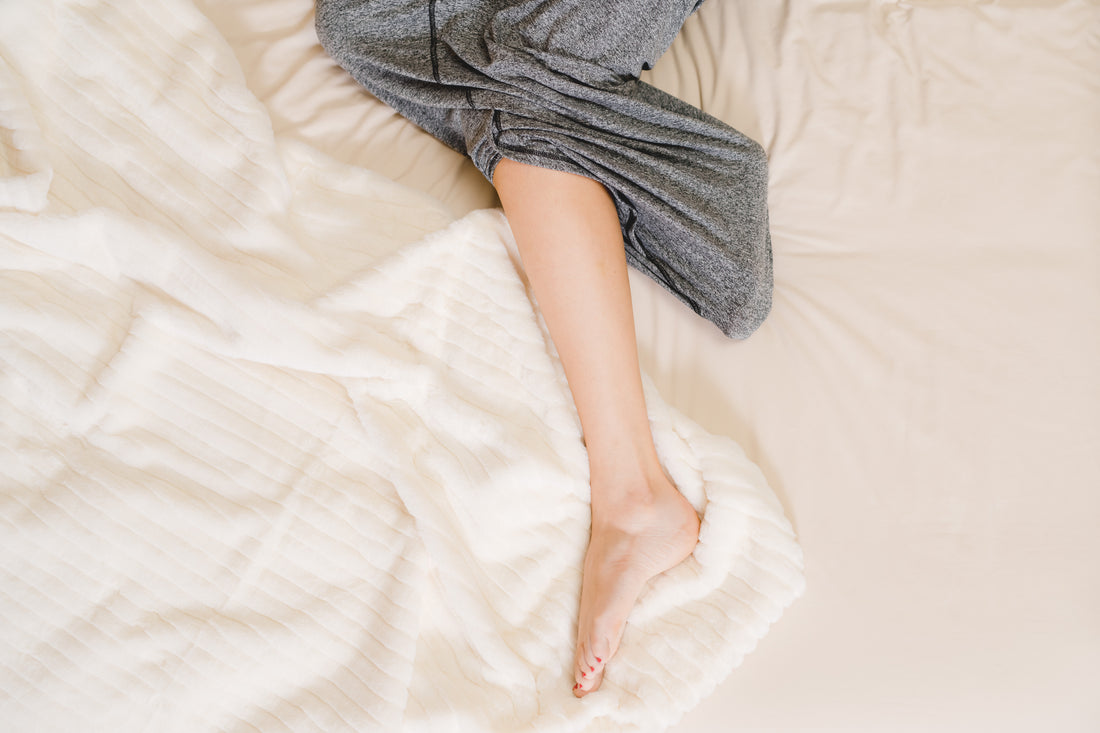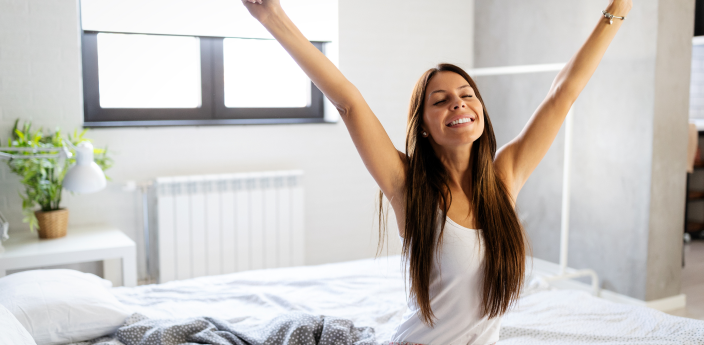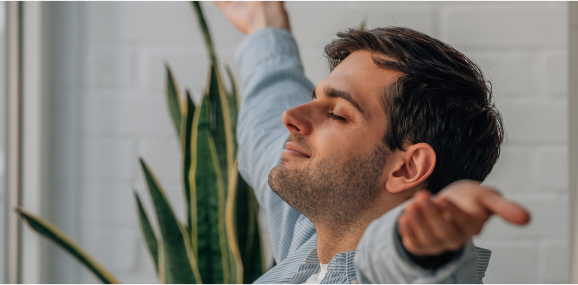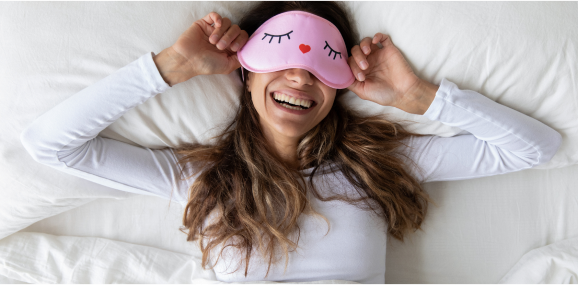No one wants to experience a lack of sleep. For some of our friends and co-workers, we can immediately tell the moment they walk through the door if they did not sleep well the night before. Daytime sleepiness can make anyone’s day more difficult, no matter what you’re doing.
For those of us who have gone through sleepless nights only to be drowning in drowsiness the following day, we know this is a serious struggle. Not getting enough sleep has some problematic side effects.
A lack of sleep can be exceedingly difficult for older people. If you’re an older person, you may have noticed that getting a restful night’s sleep has gotten more difficult as you’ve aged. You’ve tried going to bed early, and you’ve looked up different methods that could help improve your sleep, but nothing has worked.
You are not alone. Many older adults experience this same phenomenon. There are plenty of factors that can lead to age-related sleep problems.
Why Do Older People Experience Sleeplessness?
Understanding why you have struggled with getting good sleep is the first step to resolving that sleeplessness.
Firstly, you could be experiencing trouble finding ways to relax, which in turn affects your sleep cycle. Relaxation is key to helping our bodies prepare for restful sleep.
Let's get down to the nitty-gritty so you can start getting the sleep you deserve. What is causing your lack of sleep or hampering your ability to relax? And what can you do to counteract that?
Here are a few things that may help you start your journey to better sleep and relaxation:
How Does Age Affect Sleep?
It’s no secret that for most adults, age directly correlates to high-quality sleep. As you age, your body’s chemical and physiological changes can affect your sleep cycle.
When this happens, you may feel tired earlier, get up earlier, have difficulty staying asleep, and have difficulty falling back asleep when you have woken up.
Losing sleep in this way can also have a heavy impact on how you feel throughout the day. Lack of sleep can lead to excessive sleepiness, lack of ability to concentrate or focus, irritability, and overall fatigue.
When someone is exhausted, it can lead to unnecessary stress that hampers their ability to relax. This is a miserable cycle that many find themselves in time and again.
Why Is Sleep So Important With Age?
When we were young, everyone would always say a good night's sleep is important for our bodies so we can “grow up big and strong.” Older adults are done growing, but they still need sleep to function and give their brains the rest they need to stay sharp.
Getting a good night of sleep can improve memory formation, the ability to concentrate, cell regeneration, and it’s also critical for immune health. Older people need restful sleep on a nightly basis to ensure a smooth transition into old age.
A person’s quality of life hinges significantly on factors like memory and immune health. So, take control of your sleep and make sure you are waking up refreshed and ready to take on the day. A great night's sleep goes beyond just the short-term benefits of feeling good the next day.
To know how to improve your sleep, you must first understand what may be causing you not to sleep well. You will first need to understand what good sleep means and why it is harder for older people to get good sleep.
How Can Age Change the Way You Sleep?
The amount of sleep a person needs depends on their unique genetics and physiology. Most adults need about seven to nine hours of sleep on any given night. A solid rule of thumb for knowing how well you have slept the night before is to monitor how you feel in the morning.
No matter how many hours of sleep you think you got, if you wake up feeling refreshed, you got enough. If you wake up groggy and tired, odds are that you didn’t sleep long enough or deep enough to hit the sleep cycles needed to recharge you.
As you get older, your body naturally produces fewer growth hormones. This can cause your body to produce less melatonin, hampering its ability to enter into the deepest and most vital part of the sleep-wake cycle. Most people who declare themselves light sleepers may be experiencing less melatonin production.
This kind of light sleep can leave you very tired throughout your day. You may even feel the need to go to bed earlier than you need to or take naps throughout the day to make up for the lack of refreshing sleep. Naturally, the way you approach sleeping will change as you age.
What Causes Sleep Issues?
There could be several physical and mental factors causing you to have problems sleeping.
One major factor that leads to a lack of good sleep for many people are feelings of anxiety and stress. Unfortunately, these two feelings are something many older people deal with daily.
Some other factors include:
- Negative Sleep Habits: Going to bed at an unreasonable hour, drinking alcohol before sleeping, and leaving the TV on all night are all bad habits that can negatively affect sleep hygiene.
- Not Getting Enough Exercise: Not exercising can throw your body off by either making it always feel tired or making it feel like it's not time to go to sleep when it’s bedtime. When your circadian rhythm is out of wack, sleeplessness will follow.
- Pain or Medical Issues: Comfortability is huge when it comes to sleep. You may not get good sleep if you don’t get treatment for any pain or discomfort due to medical issues.
- The Absence of Social Stimulus: Getting out and interacting with people is not only rejuvenating for the soul, but it may also challenge you mentally. Mental exhaustion can help with relaxation at the end of a long day.
What Can You Do To Improve Your Sleep Habits?
Now that you have a good idea of what could be causing you to lose sleep at night, it’s time to discuss what can help you foster good sleep habits. Ultimately everyone is different and should discuss their individual issues with their physician, but here are a couple of tips to keep in mind.
There are three main ways to improve sleep habits: implement healthier habits throughout your day, take care of your mind and body, and improve your sleeping environment.
What Healthy Habits Can Improve Your Sleep?
It goes without saying that diet and exercise play a huge part in how your body operates (and we’re saying it again for good measure!). For your body to function properly, you must pay attention to what you put into it and how you’re using your body each day.
Having a healthy diet is important, and it’s crucial to be especially vigilant about what you eat and drink before bed.
The Basics of a Good Diet
- Overall balance: Talk to a dietician (if one is available), figure out what your diet is missing, and make the appropriate changes. Try to do some meal planning and cut out fast food. Your body requires a certain amount of vitamins and nutrients. Even if your problems aren’t strictly diet-related, treating your body well can only help any health issue.
- Caffeine intake: Make sure you are not consuming caffeine near bedtime. A good rule is to not consume coffee, chocolate, soda, tea (herbal is OK) or any other caffeinated substances within three hours (or more) from your bedtime.
- Don’t drink too much liquid before bed: Drinking a lot of water or any other liquid before bed could result in frequent trips to the bathroom during the night. Avoid doing this so that your body can experience an uninterrupted sleep cycle.
These changes are small but can make a big difference in your day-to-day life.
Dietary Practices That Can Hurt You
There are also food and drink habits that can negatively affect your sleep. Keep these notes in mind when refining your diet for a better sleep schedule:
- Sugary foods: It is very important to limit the number of sugary foods and refined carbs (pasta and white bread) that you consume on any given day. These types of foods, while not the best for you for several reasons are notably bad for your sleep. They can hinder your body’s ability to enter into the deepest part of the sleep cycle (REM sleep, i.e. Rapid Eye Movement sleep) by waking you up.
- Don’t go to bed hungry: While you should not eat big meals within three hours of going to sleep, you should make sure that you don’t go to bed hungry. Having a little snack like granola, yogurt, or fruit can satisfy hunger and still be light enough to not negatively affect your sleep.
- Avoid drinking alcohol before bed: Many people believe that alcohol will help them sleep, but that is simply not true. It can actually disrupt sleep and decrease the quality of the sleep that you do get.
The Importance of Exercise for Sleep
Exercising is another surefire way of improving sleep and nipping insomnia in the bud. While it can’t fix everything, it can help improve your sleeping patterns.
Exercise is critical to overall wellbeing, and it’s also an activity that helps keep the mind sharp. Even just short little breaks of exercise through the day can help improve virtually all aspects of your life. You can even make it a new hobby or way to meet new people.
Here are a few examples of good exercises for older adults:
- Walking or cycling: Going for a walk down the street, biking a trail, or getting some treadmill time can do wonders for the respiratory system. They are great ways to get your heart rate up, get your blood flowing, and tire you out for a good night’s rest.
- Swimming: Doing laps in a pool or treading water is a great way to strengthen every muscle group and be active each day while being incredibly low impact on your joints (in fact, it’s basically no impact).
Any exercise that elevates your heart rate can support respiratory health. A healthy movement routine can also boost your mood by releasing mood-supporting hormones and exposing you to sunlight.
Exercising is definitely worth trying when looking to improve the way you sleep, and extend sleep duration.
How Does Mental Health Affect Sleep?
How you feel about yourself and the world around you can deeply affect the way you sleep. We all know what it was like to be a blissful child, ignorant of the complexities of the world around us. For most of us, it was easier to sleep then (at least that’s how we remember it).
Now? Not so much. With age comes responsibilities like work and taking care of children. Life hits you fast, and, unfortunately, it can leave you feeling anxious and stressed. Anxiety and stress are two of the great contributors to sleeplessness in older adults.
There is nothing inherently wrong with being stressed or anxious. It shows that you care deeply about whatever it is. However, you have to learn how and when to let things go when it comes to your sleep. Letting your mind churn on things that make you stressed and anxious is a one-way ticket to terrible sleep. So, how can this be done?
Here are a few ways to let go of stress so you can relax and get better sleep:
Read
Reading a book that relaxes you can distract you from your daily stresses and get you in the perfect mood for sleep. It’s a great excuse to shut off the TV and eliminate backlit screens from your nightly routine.
Be sure you are not reading on a tablet or backlit e-reader. The light will trick your eyes into thinking it’s time to be awake.
Listen To Music
Listen to music you like, but make sure it is relatively calming, with nothing too upbeat. Setting the night’s tone with soft music that makes you feel happy and relaxed is always a nice touch.
Maintain Your To-Do List
Check tasks off of your to-do list, set your personal goals for the next day, and then put your list away. Put your trust in your own process, and don’t worry about tomorrow.
Know that getting a good night’s sleep is doing you more good than lying awake, contemplating how you will achieve the next day’s tasks.
Journal
Writing down your thoughts, particularly about what is causing you stress, can do wonders for your mind as it winds you down for the night as you process the day’s events. In this way, writing can be a great way to release stress. It takes it out of your mind and puts it on paper.
Journaling has been shown to help people who experience high amounts of stress at night. Putting pen to paper can allow you to relax and fade into a nice sleep.
Try Relaxing for a Bit Before Actually Sleeping
If you are experiencing difficulty sleeping and it is making day-to-day life incredibly stressful, it can turn into a vicious cycle that is tough to break out of. Try making relaxation the ultimate goal before sleep.
If you practice relaxation techniques, then your mind will take pressure off of the situation. Grab a book and your favorite blanket and get ready to feel relaxed.
How Improving Your Sleep Environment Can Improve Your Sleep
Being comfortable is so important when it comes to sleep. We all long for cozy spaces, but many of us don’t prioritize making our sleeping space comfortable. Falling asleep is made easier with relaxation.
Making sure your sleeping environment is comfortable plays a huge part in helping you fall and stay asleep. If you are experiencing issues with this, then cleaning up your sleeping environment can help.
Everyone has different preferences, so don’t be afraid to try out something new, like an oil diffuser or a white noise machine.
Here are a few ways to create a comfortable sleeping environment:
Make Your Room Cold and Dark
Keeping your bedroom cold and dark is a great way to give your body what it naturally needs to sleep. Most people sleep better in a room with cooler temperatures. Keeping it dark in your room can help your body know that it is time for rest.
Invest in a Good Bed
There’s nothing worse than sleeping on a mattress that does not suit your needs or preferences. Find a good mattress that is to your liking and fit it with comfortable sheets, a fluffy comforter, soft pillows, and anything else that will make you feel like you’re sleeping on a cloud.
The minute you lie down, you should feel ready to enter dreamland.
Your Bedroom
If your bedroom is where you work from home, spend time on your hobby, work out, or do anything else but sleep and relax, you are doing yourself a disservice. Your bedroom should only be associated with sleep and all things unwinding.
Restricting your bedroom to a limited number of activities will make your bedroom feel much more welcoming and relaxing at the end of the day. When your mind associates sleep exclusively with your room, relaxation can become an almost habitual reaction when you step foot into your sleep sanctuary.
Get Away From Distractions
If your partner snores or likes to stay up later than you, then invest in some earplugs or a white noise machine. No one wants to be kept up all night by a loud partner, and your partner probably doesn’t want to do that to you. Ensure that no annoying sounds will keep you up anymore by either blocking them or drowning them out.
If you have a sleeping partner who wants a nightlight, then get yourself a silky eye cover. It is essential that your mind thinks it’s dark at all times of the night.
Turn Screens Off Early
It has been proven over and over again that backlit screens like phones, TVs, laptops, and tablets can have a negative effect on your ability to relax and ultimately interfere with your sleep cycle.
It is suggested that you shut off all screens at least an hour before attempting bedtime. If this doesn’t seem to yield any results, try turning them off even earlier.
Essential Oils
There are all types of essential oils out there that promote relaxation. You can use them in an oil diffuser in the corner of your bedroom, or you can spray a little bit on your pillow or even your bedposts.
Look for oils that encourage relaxation, like lavender. Choose a fragrance you prefer. Keep in mind that not all oils are safe for pets or sensitive people, so if you have a curious critter in your house or a history of easy nasal irritation, put your diffuser somewhere they can’t get to it and somewhere it won’t bother you by being too strong.
Other Ways To Relax
Everyone wants to feel relaxed at the end of the day. Some people find relaxation in the small things like petting and cuddling with their dog or cat or reading a nice book. Others enjoy something that stimulates the mind, like chess or board games.
Others aren’t so lucky. Maybe you haven't quite discovered a way to feel truly relaxed when the day is coming to a close. Maybe lying down seems to kick start your brain into overdrive. Maybe you just can’t seem to avoid this type of brain activity the moment your head hits the pillow.
There’s one more solution to try.
Consider the Sleep Pod for Ultimate Relaxation
For an even deeper sleep, consider the Sleep Pod to aid in your journey toward relaxation. The Sleep Pod is a wearable blanket that wraps around your body to facilitate something called deep touch pressure therapy, which works to soothe your nerves and calm you by applying gentle all-around pressure.
This ground-breaking blanket can help relieve feelings of anxiety and ease that end of day tension. Using light compression to the entire body, the Sleep Pod can help ease the mind and body and get you ready for sleep.
Deep touch pressure therapy simulates the feeling of being hugged. Using the Sleep Pod is like receiving a calming, comforting hug all night long. Similar to a weighted blanket, the Sleep Pod exists solely to bring you the calming comfort you desire when you feel stressed or anxious.
A Little R&R: Rest and Relaxation
Older adults the world over experience sleeplessness. Age can change so many things about a person, including the way they look, the way they feel, and definitely the way they sleep.
It is important to understand that our bodies naturally change, and we need to make adjustments to maintain healthy sleep habits. It is up to us to recognize how our sleep patterns have changed through the years. Only then can we take the appropriate steps and effectively move towards healthier sleep habits.
Seeking to know and understand all of the issues that can cause unhealthy sleep patterns is a great start. Implementing ways to resolve issues affecting sleep will help you zero in on what may be the true core of the problem. It could be one specific issue, like keeping the TV on until you fall asleep. Or, it could be an all-encompassing thing like the feelings of stress and anxiety at night.
Once you understand the factors that could be hindering your sleep, you can take specific actions to move toward better rest.
A Cozy Relaxation Technique
There are many ways to improve health. Regular physical exercise, good mental health care, and relaxation techniques can help you achieve better sleep.
At Hug Sleep, we know that getting a good night's sleep is rooted in genuine relaxation. You are never going to relax unless you feel comfortable and safe.
Taking the time to implement relaxation techniques into your nightly routine is not only enjoyable but also aids in your journey toward better sleep. It might be playing with your pets, snuggling up in your Sleep Pod, or listening to great music. Whatever it is, it will help ease your feelings of anxiety and stress at the end of your day.
Trying to get a good night’s sleep can be exhausting in and of itself. Be sure to talk to your doctor about everything you are trying. Ensure that it is physically and mentally safe for you to implement the practices you are trying. And if the thing that is making you anxious at night persists, be sure to talk to a friend and/or a professional.
There are people around every corner willing to help you be the best you can be.
Sources:
Sleep Tips for Older Adults | Help Guide
Aging and Sleep | Sleep Foundation
8 Tips to Help Older People Fall — and Stay — Asleep | Michigan Health
Alcohol and Sleep | Sleep Foundation
How Much Sleep Do I Need? | Good Housekeeping
Essential Oils to Help You Get More Sleep | Sleep Foundation

































500,000+ happy customers